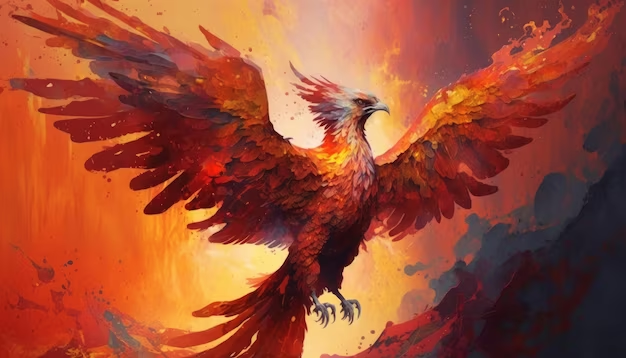A mythical bird associated with rebirth and immortality, the phoenix has served as a symbol of change and renewal in many civilizations. Numerous names for phoenix birds can be found in mythological writings and folklore, reflecting the awe-inspiring nature of this magnificent creature that rises from its own ashes. Let’s explore the fascinating world of phoenix names and find out where they came from.
The Origin and Significance of the Phoenix

The legendary phoenix has a long and storied past that extends far into the annals of mythology and folklore. Many cultures place great importance on this mythical bird, which represents many ideas, like the sun, eternal life, and the profound nature of death and rebirth.
Ancient Origins
Greek, Egyptian, and Chinese mythology all make reference to the phoenix, although its roots go much further back in time:
- Greek Mythology: The Greek sun deity Apollo is linked to the phoenix in Greek mythology. The phoenix, with its brilliant, flaming plumage, was thought to reside in distant Arabia. The Greek word for phoenix, “phoinix,” also meant date palm tree.
- Egyptian Mythology: One name for the phoenix in Egyptian mythology is the “Bennu bird.” Some of the things that the Bennu bird stood for were the sun, new life, and creation. It was thought to symbolize the rebirth that follows death and was linked to the god Ra.
- Chinese Mythology: In Chinese mythology, the phoenix is called the “Fenghuang.” The Fenghuang is a composite being that stands for balance and harmony, in contrast to the Western phoenix, which is typically shown as a bird of fire. It represents virtuousness and the harmony of opposites.
Symbolism of the Phoenix
The phoenix is a powerful emblem with meaning that goes beyond its legendary roots:
- Immortality: The phoenix’s capacity to endure the flames of death and then rise again from the ashes has made it a symbol of immortality. This recursive process exemplifies the idea of immortality and regeneration through representing the everlasting cycle of life, death, and rebirth.
- Renewal and Regeneration: The rebirth of the phoenix from its ashes is a metaphor for regeneration and renewal of life. As a potent symbol of rebirth, it represents the ability to face and conquer obstacles and come out stronger on the other side.
- Sun and Light: The phoenix represents the sun and all that it stands for in many civilizations thanks to its brilliant plumage and its long history of association with the sun. Hope and enlightenment are typically associated with it.
Phoenix in Literature and Art
The symbolic meaning of the phoenix has been deeply etched into many cultural expressions, including literature and art:
- Literature: In literature, the phoenix is a common motif, appearing in works as diverse as “Divine Comedy” by Dante Alighieri and Ovid’s “Metamorphoses.” Phoenix Fawkes, a symbol of loyalty and rebirth in J.K. Rowling’s “Harry Potter” series, is another renowned figure in contemporary fiction.
- Art: The phoenix’s dynamic appearance has long served as an inspiration to artists. Its depiction in artworks spanning centuries demonstrates its timeless allure as a topic for creative expression.
- Cultural Celebrations: In many cultures, the phoenix is a central figure in ceremonial and festive occasions. As an example, the Fenghuang is often linked with weddings and other joyous moments in Chinese culture, where it represents harmony and oneness.
Names for a Phoenix in Different Cultures
The phoenix is a universal symbol that transcends cultural boundaries. Different cultures have their own names and interpretations for this mythical creature. Let’s explore some of these names and their significance:
| Mythology | Name | Significance |
| Ancient Greek Mythology | Phoenix | The very term “Phoenix” has its roots in Greek mythology, where the mythical bird was a representation of immortality and rebirth. The Greeks saw the phoenix as a metaphor for the everlasting cycle of birth, death, and rebirth because of its ability to endure fire before emerging from its own ashes. |
| Chinese Mythology | Fenghuang (鳳凰) | The phoenix, or ‘Fenghuang,’ in Chinese, is a symbol of balance and harmony. In contrast to the fire-associated Western phoenix, the Fenghuang is typically shown as a majestic bird with multicolored plumage, representing the harmony of masculine and female energies and the union of yin and yang. |
| Egyptian Mythology | Bennu | “Bennu” is the Egyptian name for the phoenix. The sun and this legendary bird are closely linked in mythology. The Bennu was an important figure in Egyptian cosmology; the Egyptians thought she was Ra, the sun god’s soul. |
| Arabian Folklore | Anka (عنقاء) | The phoenix is called the “Anka” in Arabian mythology, and it is said to possess great intelligence. Symbolic of rebirth from ashes, the Anka is often linked with ideas of transformation and renewal, much like the Western phoenix. |
Names for a Phoenix Bird: A Dive into Variants
Numerous cultures have given the mythical phoenix numerous names, each of which captures something special about the bird.
Mythical Names for a Phoenix
The phoenix’s various mythical and folkloric names reflect its association with fire, rebirth, and the sun.
| Name | Description |
| Pyrausta | The phoenix is called Pyrausta in other stories, which emphasizes its flaming character. The mythical Pyrausta is a fire-breathing monster that represents the phoenix’s eternal rebirth. |
| Yel | The Slavic word “yel” means “sun bird” and is used to describe a bird that resembles a phoenix. Yel represents the nocturnal cycle of day and night, which is reflected in the phoenix’s everlasting life cycle of birth and death. |
The phoenix has deep symbolic meaning in the cultural traditions of many civilizations, and these fabled names provide us a glimpse of that meaning. Pyrausta emphasizes its blazing and metamorphic qualities, while Yel stresses its relationship to the ruling celestial body.
Modern Adaptations of Phoenix Names
The myth of the phoenix has persisted into modern times, captivating readers and viewers alike. Many authors and artists have given this legendary beast new names, each offering a unique take on its meaning.
| Name | Source | Description |
| Fawkes | Harry Potter series by J.K. Rowling | One famous modern-day phoenix is Fawkes, the one owned by Albus Dumbledore in the Harry Potter books and films. Highlighting the phoenix’s symbolism for hope and rebirth, Fawkes is renowned for his unwavering devotion and the restorative powers of his tears. |
| Solaris | Modern Interpretation | An entirely modern name, Solaris takes its cue from the sun. Light, life, and rebirth are all aspects of the phoenix that this represents. As a representation of light and perseverance in the midst of darkness, Solaris embodies the phoenix’s meaning. |
The fact that these names have been updated to reflect modern times shows how popular this mythical bird is in literature and media today. Fawkes represents healing and loyalty in the Harry Potter books, and Solaris represents the phoenix as a modern-day emblem of light and rebirth.
The Symbolism Behind Phoenix Names

Names for a phoenix bird often carry deep symbolic meanings:
Regeneration and Renewal
The incredible ability of the pheasant to resurrect from its own ashes is a symbol of metamorphosis and renewal, and names that communicate this idea highlight this:
- Rebirth: Because the phoenix can rise from the dead and take flight again, this name is a metaphor for rebirth and a new beginning.
- Renaissance: In honor of the phoenix’s ability to rise from the ashes and become something new, the term “revolution” has been used to describe this rebirth.
- Reviviscent: The phoenix’s name, reviviscent, comes from the word “revive,” which describes its regeneration abilities.
- Rekindle: The phoenix rises from the ashes, and the phrase “rekindle” refers to the act of reigniting a flame.
- Agnis: The phoenix’s flaming rebirth is symbolized by the Latin word “ignis,” meaning “fire,” which is the inspiration for the name Agnis.
Fire and Sun
Because of their link to the sun and their flaming plumage, phoenixes are often thought of as symbols of fire and the sun. The names in this group convey the vivacious and brilliant character of the bird:
- Blaze: The name Blaze conjures up an image of a raging inferno, which is fitting given the phoenix’s flamboyant nature and spectacular appearance.
- Helios: The phoenix’s name alludes to its relationship with the sun and its luminous nature; it is named after the Greek deity of the sun.
- Pyra: Named Pyra, meaning “pyre,” the phoenix is a symbol of both death and rebirth, as it is often associated with funeral pyres.
- Flare: Like the phoenix’s blazing essence, the name “flare” suggests an abrupt outburst of energy.
- Luminara: The luminous and brilliant phoenix is reflected in the feminine name Luminara, which means light and illumination.
Immortality and Longevity
Phoenix symbolism revolves around the idea of everlasting life and immortality. Names that fall into this group highlight the enduring character of the bird:
- Immortus: The name of the phoenix is a direct translation of the word “immortal,” which means that it will never die.
- Eternia: The name means “eternal,” which highlights the bird’s perpetual character and its life cycle that never ends.
- Perpetua: The name Perpetua evokes thoughts of everlasting life and rebirth, much like the phoenix’s eternal cycle of rebirth.
- Infinity: Like the phoenix’s everlasting rebirth and lasting legacy, the term infinity signifies boundless duration and existence.
- Endless: The word “endless” is a metaphor for the phoenix’s eternal life cycle and the eternities into which it is born.
Nature and Elements
In addition to the basic meaning, the symbolism of the phoenix can be further deepened by considering names that are derived from natural and elemental sources:
- Aquila: Aquila, from the Latin for “eagle,” emphasizes the phoenix’s regal and avian nature.
- Verdant: The phoenix represents rebirth and renewal in nature, while the name “verdant” evokes images of verdant growth and verdant foliage.
- Tempest: The phoenix’s name, which means “strong storm,” emphasizes its resilience and ability to face adversity head-on.
- Aether: Named after the elemental idea of “ether” or “spirit,” this name symbolizes the phoenix’s otherworldly qualities and ethereal appearance.
- Zephyr: Zephyr, meaning a soft wind, alludes to the phoenix’s serene nature, which stands in stark contrast to its blazing resurrection.
Mythology and Legends
The mythological and mythical can serve as inspiration for phoenix names, which help to connect the bird to a larger story:
- Garuda: The mythical bird-like creature Garuda is the inspiration for this name, which conveys the phoenix’s regal and heavenly nature.
- Simurgh: The name “Simurgh” is derived from the Persian mythology of a benign legendary bird, and it represents the protective and nurturing nature of the phoenix.
- Fenghuang: The term Fenghuang has cultural importance and mystery because it is borrowed from Chinese mythology, where the phoenix is called Fenghuang.
- Firebird: The firebird is a simple moniker that alludes to the bird’s fiery personality and its status as a legendary beast in many civilizations.
- Roc: The phoenix’s name alludes to the gigantic bird from Persian and Arabian mythology, emphasizing its legendary status.
Positive Traits and Virtues
The symbolic character of the phoenix can be further shaped by giving the bird names that reflect positive qualities and virtues:
- Valor: Valor is a name that means bravery and courage, which is fitting because the phoenix remains unflinching in the face of its fiery rebirth.
- Hope: Like the phoenix, which brings hope via renewal, the name Hope is associated with optimism and the belief in better days.
- Gracewing: The name Gracewing, a portmanteau of “grace” and “wing,” captures the regal and elegant nature of the phoenix.
- Nobleheart: Named after the phoenix’s noble and dignified nature, “Nobleheart” conveys the bird’s air of respect and grandeur.
- Resilience: Phoenix means “resilience” in Greek, which refers to the bird’s power to overcome hardship and rise again.
Cultural Significance
Phoenix names can also be influenced by the cultural significance of the bird in various traditions:
- Bennu: Named after the ancient Egyptian deity associated with the sun and rebirth, this name holds historical and cultural importance.
- Hou-ou: Derived from Japanese mythology, where the phoenix is known as Hou-ou, this name carries cultural reverence and mysticism.
- Anka: Inspired by Turkish folklore, where the bird is called Anka, this name reflects the phoenix’s role in local legends.
- Firenze: A name with Italian origins, representing the phoenix’s connection to fire and renewal, while also invoking images of the city of Florence.
- Solis Ave: Combining “solis” (Latin for sun) and “ave” (Latin for bird), this name highlights the phoenix’s solar association.
Literature and Pop Culture
In literature and pop culture, phoenixes often play significant roles, inspiring unique and creative names:
- Fawkes: Named after the loyal phoenix in J.K. Rowling’s Harry Potter series, this name carries a sense of loyalty and devotion.
- Jean Grey: Drawing from the Marvel Comics character, Jean Grey, who becomes the powerful Phoenix, this name reflects strength and transformation.
- Ignis: A name inspired by various video games and fantasy novels, signifying fire and the phoenix’s fiery attributes.
- Risingstar: This name combines “rising” and “star,” symbolizing the phoenix’s ascent and its radiant presence in the night sky.
- Asha: Inspired by George R.R. Martin’s “A Song of Ice and Fire” series, where dragons and mythical creatures, including phoenixes, are prominent.
Conclusion
The phoenix, a bird shrouded in mystery and awe, has captivated human imagination for centuries. Its various names across different cultures not only add to its mystique but also reflect the rich tapestry of mythology worldwide. Whether you’re enchanted by the immortal Fenghuang, the wise Anka, or the fiery Pyrausta, the names for a phoenix bird are as diverse and fascinating as the legend itself. The exploration of these names leads us into a deeper understanding of the mythological and cultural significance of this incredible creature.
The phoenix’s enduring legacy in mythology reminds us of the timeless themes of rebirth, transformation, and the eternal cycle of life and death. As we continue to uncover and interpret the myriad names for a phoenix, we keep the flame of this ancient legend alive, allowing it to rise anew in our collective consciousness.
FAQ
What are some popular names for a phoenix bird in mythology?
In mythology, names like Phoenix, Fenghuang, Bennu, and Anka are quite popular.
Can the name ‘Phoenix’ be used for both genders?
Yes, the name ‘Phoenix’ is gender-neutral and can be used for both male and female phoenixes.
Are there any modern literary names for a phoenix?
Yes, names like Fawkes from Harry Potter and Solaris are modern literary adaptations.
How do names for a phoenix vary across cultures?
Names for a phoenix bird vary significantly across cultures, each reflecting unique attributes and symbolisms of the phoenix in that culture.
Is there a name for a baby phoenix?
While there’s no specific name for a baby phoenix in classic mythology, terms like ‘Phoenix Chick’ or ‘Pyrausta’ can be used.












+ There are no comments
Add yours